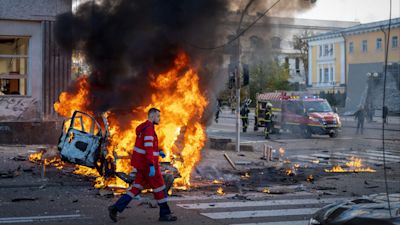G7 leaders accuse Russia of war crimes in latest attacks on Ukraine and vow to step up sanctions

Renewed Russian airstrikes in Ukraine will be at the top of the upcoming G7 agenda, Martha Fairlie reports
Vladimir Putin's latest attacks on Ukraine have been labelled "war crimes" by the UK and its allies.
G7 leaders promised to increase sanctions against Russia as they denounced the latest round of attacks on Ukraine.
"We condemn these attacks in the strongest possible terms and recall that indiscriminate attacks on innocent civilian populations constitute a war crime," the G7 leaders said in a statement, during a virtual meeting on Tuesday afternoon.
"We have imposed and will continue to impose further economic costs on Russia, including on individuals and entities - inside and outside of Russia - providing political or economic support for Russia’s illegal attempts to change the status of Ukrainian territory," it added.
Prime Minister Liz Truss was among those who vowed to hold Putin and those responsible to account.
In a tweet she said: "The overwhelming international support for Ukraine’s struggle stands in stark opposition to the isolation of Russia on the world stage."
The G7 nations assured Ukraine’s President Volodymyr Zelenskyy that they remain "undeterred and steadfast" in their support.
"We will continue to provide financial, humanitarian, military, diplomatic and legal support and will stand firmly with Ukraine for as long as it takes," they said.
"We are committed to supporting Ukraine in meeting its winter preparedness needs."
They also warned Moscow that any use of chemical, biological or nuclear weapons by Russia would be met with "severe consequences".
The meeting came as the North Atlantic Treaty Organisation (Nato) said it plans to go ahead with long-planned drills next week.
Its Secretary General, Jens Stoltenberg, said that the exercise, named Steadfast Noon, is part of a nuclear deterrent that "has always been to preserve peace, prevent coercion and deter aggression".
"President Putin's veiled nuclear threats are dangerous and irresponsible," Mr Stoltenberg told reporters in Brussels.
"Russia knows that a nuclear war cannot be won and must never be fought. We are closely monitoring Russia's nuclear forces. We have not seen any changes in Russia's posture, but we remain vigilant."
Monday's attacks killed at least 14 people and injured almost 100 in retaliation for what Putin claimed was a terrorist act, carried out by Ukrainian special services on a bridge linking Russia with Crimea.
Russia continued its assault into Tuesday, with defence ministry spokesman Igor Konashenkov stating that Ukraine’s energy and military facilities had been targeted by long-range air strikes.
"The purpose of the strike has been achieved," he said. "All designated facilities have been hit."
International outcry was swift in the wake of Russia's assault, labelled by some as a sign of Putin’s growing desperation in the face of staunch Ukrainian resistance.
US President Joe Biden was among the world leaders to condemn Moscow's attack, commenting that it demonstrates "the utter brutality of Mr Putin’s illegal war on the Ukrainian people".
On Monday, Mr Zelenskyy said Ukraine counts on the UK’s “leadership in consolidating international political and defence support for Ukraine, in particular regarding the protection of our skies”.
Meanwhile, Ms Truss has said she is committed to following the example of her predecessor Boris Johnson, who offered ardent support for Ukraine since the start of the Russian invasion.
The UN General Assembly started debating on Monday whether to demand that Russia reverse course on attempting to annex four regions of Ukraine: the Donetsk, Luhansk, Kherson and Zaporizhzhia regions.
Want a quick and expert briefing on the biggest news stories? Listen to our latest podcasts to find out What You Need To Know
The assembly’s special session was planned before the most recent barrage, but countries took the occasion to speak out on the morning attacks that hit at least 14 Ukrainian regions, including the capital of Kyiv.
UN Secretary General António Guterres said he was “deeply shocked” by the Russian attacks.
Elsewhere, Ukrainian Ambassador Sergey Kyslytsya said some of his own close relatives were imperilled in a residential building, unable to take cover in a bomb shelter.
“By launching missile attacks on civilians sleeping in their homes or rushing toward children going to schools, Russia has proven once again that it is a terrorist state that must be deterred in the strongest possible ways,” he said.
Ukraine has called for western allies to provide anti-air and anti-missile systems in response to the attacks.
Kyiv was targeted for the first time in months, while Russia also hit civilian areas and energy infrastructure across the country, from Kharkiv in the east to Lviv near the Polish border.
Putin confirmed the strikes were a retaliation for what he called Ukraine’s attack on the Kerch Bridge, a crossing between Russia and the annexed Crimea region that has strategic and symbolic importance.
He said if Kyiv continues to mount “terrorist attacks” on Russia, the Kremlin’s response will be “tough and proportionate to the level of threats”.
Labour leader Sir Keir Starmer joined the condemnation of Russia’s actions, calling the Russian attacks “unjustifiable”.
“The UK is firmly united in condemning Putin’s latest wave of violence and destruction,” he said.
On Tuesday, the head of GCHQ said Russia appears to be running out of military weapons and is "desperate" after the latest attack on Ukraine.
"We believe that Russia is running short of munitions," Sir Jeremy Fleming told BBC Radio 4’s Today show.
“We’ve seen, because of the declaration for mobilisation, that it’s running short of troops. So I think the answer to that is pretty clear. Russia and Russia’s commanders are worried about the state of their military machine.”
“The word I’ve used is ‘desperate’," he added. "We can see that desperation at many levels inside Russian society and inside the Russian military machine."